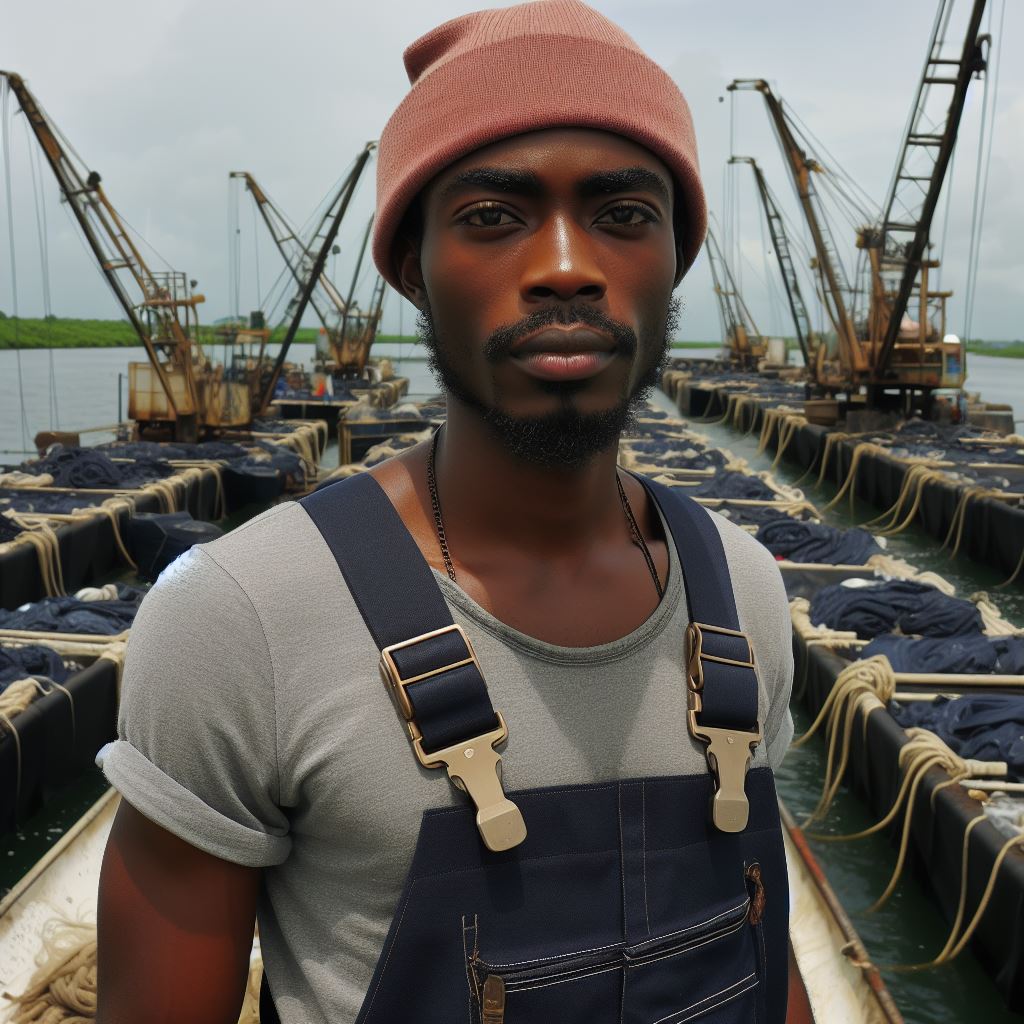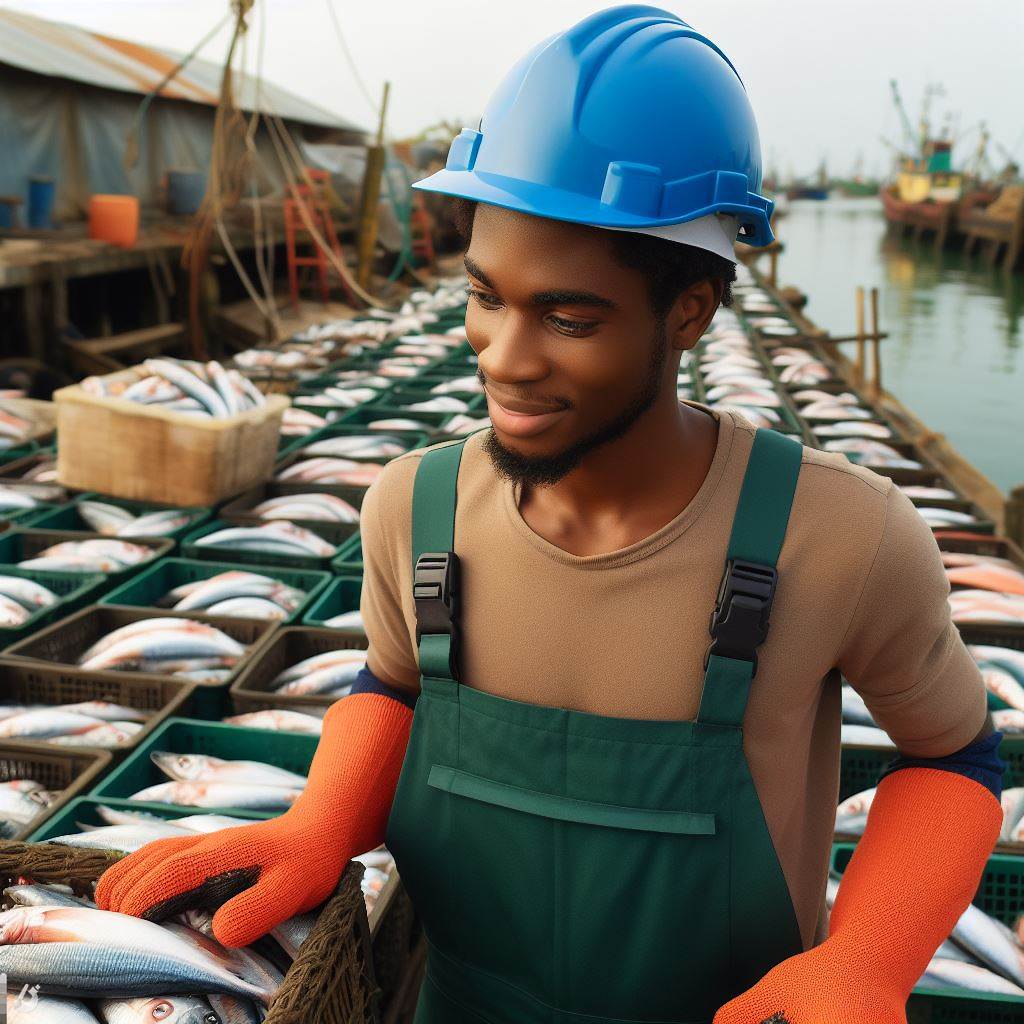Introduction
Fisheries education plays a vital role in Nigeria as it contributes to the nation’s economic development.
With its rich aquatic resources, Nigeria has the potential to become a major player in the global fishing industry.
However, the lack of proper education and training hinders the realization of this potential.
By promoting fisheries education, the government can address key issues such as overfishing, unsustainable practices, and low productivity.
Through educational programs, individuals can acquire knowledge about fishery management, conservation, and aquaculture techniques.
They can learn about sustainable fishing practices, the importance of preserving marine ecosystems, and the potential of aquaculture for food security.
Moreover, fisheries education can create employment opportunities. Trained professionals can work in fish processing, marketing, and fish farm management.
This not only reduces dependence on traditional fishing methods but also creates a more diverse and resilient fishing industry.
Furthermore, fisheries education enhances the overall well-being of fishing communities.
With better knowledge and skills, fishermen can improve their income by adopting efficient and sustainable fishing practices.
They can also learn about market trends, product value-addition, and post-harvest techniques, enabling them to command better prices for their catch.
To achieve these benefits, the government needs to play a proactive role. It should allocate sufficient funds for the establishment and enhancement of fisheries education institutions.
It should also collaborate with international organizations and educational institutions to develop comprehensive curricula and training programs.
In fact, fisheries education is essential for the sustainable development of Nigeria’s fisheries sector.
By actively promoting and investing in fisheries education, the government can ensure the long-term viability of the industry, improve the livelihoods of fishing communities, and contribute to the nation’s economic growth.
Current state of fisheries education in Nigeria
The current state of fisheries education in Nigeria reflects significant challenges and areas that need improvement.
Lack of proper infrastructure and resources in fisheries education
The lack of proper infrastructure and resources greatly hinder students’ learning experiences.
Inadequate funding has resulted in a shortage of necessary facilities, such as well-equipped laboratories and research facilities.
This absence of infrastructure impairs the ability of students to engage in practical learning, which is crucial for their understanding of fisheries practices.
Insufficient number of qualified faculty members
Additionally, the insufficient number of qualified faculty members is a pressing issue in fisheries education.
It is crucial to have experienced instructors with expertise in the field to provide quality education.
However, there is a shortage of qualified faculty members in Nigeria’s fisheries education system.
This shortage may stem from limited opportunities for faculty development and training.
Without proper training and support, instructors may struggle to deliver high-quality education and adequately prepare students for the workforce.
Limited access to modern technology and research facilities
Limited access to modern technology and research facilities further adds to the challenges faced by fisheries education in Nigeria.
Outdated technology and equipment impede students’ ability to learn about and utilize modern fishing practices.
Additionally, the absence of research facilities limits the opportunities for conducting relevant and innovative research in the field.
Without access to these resources, students and researchers may struggle to develop new and efficient fishing techniques that can contribute to the sustainable growth of the industry.
To overcome these challenges and enhance fisheries education in Nigeria, the government must play a crucial role. Firstly, there is a need for increased investment in fisheries education.
Adequate funding should be allocated to improve infrastructure, including the establishment of well-equipped laboratories and research facilities.
This would ensure that students have access to practical learning opportunities and the necessary resources to enhance their understanding of fisheries practices.
Secondly, initiatives to attract and retain qualified faculty members should be implemented.
This can include providing opportunities for faculty development and training, as well as offering competitive salaries and benefits.
By ensuring a sufficient number of experienced instructors, the quality of education can be improved, and students can gain the necessary skills to contribute to the fisheries industry.
Lastly, the government should prioritize the provision of modern technology and research facilities in fisheries education.
Upgrading existing technology and equipment, as well as establishing research facilities, would enable students to learn about and engage with modern fishing practices.
This would facilitate innovation and research in the field, leading to the development of sustainable fishing techniques and practices.
In short, the current state of fisheries education in Nigeria faces various challenges, including a lack of proper infrastructure, a scarcity of qualified faculty members, and limited access to modern technology and research facilities.
However, by prioritizing investment in fisheries education, attracting and retaining qualified instructors, and providing access to modern resources, the government can play a pivotal role in promoting the growth and development of the fisheries industry in Nigeria.
Read: Student Experiences: Life in a Nigerian Fisheries Faculty
The role of government in promoting fisheries education
A strong and effective fisheries education system is essential for the sustainable development and management of fishery resources.
Transform Your Career with Expert Guidance
Get personalized mentorship consulting that’s tailored to your unique path. Our expert advice is actionable and exclusive.
Get StartedThe role of government in promoting fisheries education is crucial in ensuring the availability of skilled professionals in the field.
This blog section will discuss the various ways in which the government can contribute to the growth and improvement of fisheries education.
Policy development and implementation for fisheries education
- The government plays a vital role in the development and implementation of policies related to fisheries education.
- These policies aim to create a conducive environment for the growth and improvement of fisheries education.
- Government involvement ensures that the curriculum is relevant, up-to-date, and responsive to the evolving needs of the industry.
- Policy frameworks provide guidelines for the establishment and recognition of educational institutions offering fisheries programs.
- Government policies also address the accreditation and quality assurance of fisheries education programs.
Allocation of funds and resources for infrastructure development
- Government support in terms of funding and resources is critical for the development of infrastructure in fisheries education.
- Financial assistance can be provided to educational institutions to establish state-of-the-art laboratories and research facilities.
- Modernizing and expanding existing facilities helps create a conducive learning environment for students pursuing fisheries education.
- Allocation of funds for the purchase of advanced technology and equipment enhances the practical training experience of students.
- Investing in infrastructure development ensures that students have access to the necessary tools and resources for hands-on learning.
Encouragement and support for research and innovation in fisheries education
- The government plays a crucial role in encouraging and supporting research and innovation in fisheries education.
- Providing research grants and scholarships incentivize students and faculty members to engage in fisheries-related research.
- Government-funded research projects contribute to the generation of new knowledge and technical advancements in the field.
- Collaboration between educational institutions and government agencies promotes the transfer of technology and expertise.
- Supporting innovation in fisheries education improves the teaching methods and pedagogical approaches used in classrooms.
In essence, the active involvement of the government is essential in promoting fisheries education.
The development and implementation of policies, allocation of funds for infrastructure development, and encouragement of research and innovation all contribute to the growth and improvement of the fisheries education system.
By prioritizing education in the fisheries sector, governments can ensure the availability of skilled professionals who can effectively contribute to the sustainable management of fishery resources.
Read: Research Innovations from Nigerian Fisheries Departments
Government Initiatives for Promoting Fisheries Education
The vital role of fisheries in sustaining global food security and economic growth underscores the necessity for a well-trained workforce in this field.
Recognizing this, governments worldwide have taken proactive measures to promote fisheries education.
In this section, we delve into three key initiatives that showcase the government’s commitment to fostering excellence in fisheries education.
Establishment of Specialized Fisheries Educational Institutions
Governments have spearheaded the creation of specialized fisheries educational institutions to provide a focused and comprehensive learning environment.
These institutions play a pivotal role in equipping students with the necessary skills and knowledge to navigate the complexities of the fisheries sector.
By tailoring curricula to the specific demands of the industry, these institutions ensure that graduates are not only academically proficient but also well-prepared for the practical challenges of fisheries management.
Examples include the establishment of Fisheries Universities and specialized institutes that offer degrees in fisheries science, aquaculture, and marine biology.
Scholarships and Grants for Deserving Students Pursuing Fisheries Education
Financial barriers should not hinder passionate and deserving individuals from pursuing education in fisheries.
Governments have implemented scholarship and grant programs to support students who exhibit academic excellence and a commitment to contributing to the fisheries sector.
These initiatives aim to attract talented individuals to the field, fostering a pool of experts who can drive innovation and sustainable practices in fisheries management.
By easing the financial burden of education, governments are ensuring that the best and brightest minds are drawn to fisheries studies.
Collaboration with International Organizations for Knowledge Exchange and Capacity Building
In an era of globalization, collaboration is key. Governments actively engage in partnerships with international organizations to facilitate knowledge exchange and capacity building in fisheries education.
By leveraging the expertise of global institutions, governments can enhance the quality of education and expose students to diverse perspectives and best practices.
These collaborations contribute to the development of a well-rounded and globally aware workforce, capable of addressing the multifaceted challenges facing the fisheries sector.
Basically, the government’s role in promoting fisheries education is multifaceted, encompassing the establishment of specialized institutions, financial support for students, and global collaboration.
These initiatives collectively form a robust framework that not only addresses the immediate educational needs but also lays the foundation for a sustainable and thriving fisheries industry.
Read: Scholarships and Funding for Fisheries Students in Nigeria

Challenges in Promoting Fisheries Education and Government’s Response
Lack of Awareness and Understanding about the Importance of Fisheries Education
One of the foremost challenges in promoting fisheries education is the pervasive lack of awareness regarding its significance.
Many individuals remain unaware of the crucial role fisheries play in ensuring food security and economic stability.
To address this, governments must undertake comprehensive awareness campaigns, targeting both urban and rural communities.
These campaigns should highlight the importance of fisheries education in sustaining aquatic ecosystems, meeting global nutritional needs, and fostering economic growth.
Governments should collaborate with educational institutions, NGOs, and industry stakeholders to develop outreach programs.
These initiatives should not only emphasize the ecological and economic benefits of fisheries education but also showcase success stories of individuals who have positively impacted their communities through their knowledge and skills acquired in fisheries studies.
Addressing the Increasing Demand for Skilled Professionals in the Field
As the demand for fish and seafood continues to rise globally, there is a parallel need for skilled professionals in the fisheries sector.
However, meeting this demand poses a significant challenge due to the shortage of qualified graduates.
To tackle this issue, governments should invest in expanding fisheries education infrastructure and curriculum development.
Scholarship programs and financial incentives can be introduced to attract more students to pursue fisheries education.
Additionally, collaboration with private industries can ensure that the curriculum remains aligned with the evolving needs of the sector.
By fostering partnerships with fisheries businesses, governments can facilitate internships and on-the-job training, preparing students for real-world challenges and enhancing their employability.
Enhancing Industry Linkages and Job Placements for Fisheries Graduates
The disconnect between academic institutions and the fisheries industry is another obstacle in promoting fisheries education.
Governments can play a pivotal role in bridging this gap by facilitating stronger linkages between educational institutions and industry players.
Establishing advisory boards comprising professionals from the fisheries sector can help align academic programs with industry requirements.
Furthermore, governments should work towards creating a conducive environment for job placements.
Offering incentives to companies hiring fisheries graduates, implementing mentorship programs, and organizing job fairs can enhance the employability of fisheries graduates.
By actively involving the industry in the education process, governments can ensure that their efforts translate into meaningful employment opportunities for fisheries graduates.
In a nutshell, addressing the challenges in promoting fisheries education requires a multi-faceted approach with active government involvement.
By raising awareness, expanding infrastructure, and fostering industry collaboration, governments can play a crucial role in developing a skilled workforce that contributes to the sustainable growth of the fisheries sector.
Read: Evolution of Fisheries Studies in Nigeria: A History
Discover More: Government Policies Affecting Livestock Production
Success stories and impacts of government’s efforts in promoting fisheries education
Increase in the number of fisheries educational institutions
The government’s active involvement in promoting fisheries education has led to a significant increase in the number of educational institutions focusing on fisheries.
Through funding and policy support, the government has encouraged the establishment of new fisheries colleges and universities.
This increase in educational institutions has provided more opportunities for aspiring students to pursue higher education in fisheries.
Furthermore, it has facilitated the growth of skilled manpower in the fisheries sector.
Improvement in the quality of education and infrastructure facilities
The government’s efforts have also resulted in a notable improvement in the quality of education provided by fisheries institutions.
With increased funding, these institutions have been able to enhance their infrastructure and educational facilities.
State-of-the-art laboratories, research facilities, and updated curriculum have been made available.
Well-equipped classrooms and libraries have also been established, allowing students to have access to the latest information and resources.
This improvement in infrastructure has significantly contributed to enhancing the learning experience and knowledge acquisition of fisheries students.
Graduates contributing to the sustainable development of the fisheries sector
The government’s promotion of fisheries education has yielded graduates who have made substantial contributions to the sustainable development of the fisheries sector.
These graduates are equipped with the necessary knowledge and skills to tackle the challenges faced by the industry.
They are well-versed in modern techniques and practices in aquaculture, fishery management, and marine conservation.
As a result, they have been able to work towards the development of sustainable fishing practices.
These graduates are involved in research and development, innovation, and policy-making within the fisheries sector.
Their expertise has been instrumental in addressing issues such as overfishing, environmental degradation, and biodiversity conservation.
By implementing sustainable practices, they have contributed to the long-term viability of the fisheries industry.
Ultimately, the government’s active role in promoting fisheries education has had significant success stories and positive impacts.
The increase in the number of fisheries educational institutions, improvement in the quality of education and infrastructure facilities, and the contributions of graduates have all contributed to the sustainable development of the fisheries sector.
These efforts have not only provided opportunities for students but have also addressed the industry’s need for skilled professionals.
It is crucial for the government to continue supporting and investing in fisheries education to ensure the continued growth and sustainability of the sector.
Conclusion
The government plays a crucial role in promoting fisheries education.
By providing financial assistance and developing educational programs, the government ensures the availability of skilled professionals in the fisheries sector.
This support is vital in addressing the challenges faced by the industry.
Government initiatives such as scholarships, grants, and educational institutions specialized in fisheries education contribute to developing a qualified workforce.
Through collaborations with educational institutions, the government ensures that relevant and up-to-date knowledge is imparted to students, setting a strong foundation for their future careers.
Furthermore, the government’s focus on research and development in the fisheries sector enhances scientific knowledge, technological advancements, and sustainable practices
By encouraging scientific exploration, the government fosters innovation and supports a more efficient and eco-friendly industry.
Continued government support is essential for sustainable growth in the fisheries sector.
By prioritizing investment in education, infrastructure, and research, the government can empower the industry to flourish responsibly.
This support will not only secure the livelihoods of those directly involved in fisheries but also contribute to the overall economic development of the country.
In the end, the government’s role in promoting fisheries education cannot be overstated.
Its continued support is crucial for a well-trained workforce, sustainable practices, and the overall growth of the fisheries sector.
It is imperative that the government remains committed and invests in the future of the industry to ensure its continued success.




